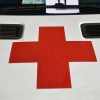 Police clash with protesters over president's controversial reforms Photo: Gustavo Garello/AP
Police clash with protesters over president's controversial reforms Photo: Gustavo Garello/AP
Streets outside Argentina's parliament turned into a «battlefield» as police clashed with protesters brandishing petrol bombs over the president's controversial reforms.
Javier Milei's shock therapy package narrowly won preliminary approval from the Senate late Wednesday before demonstrations turned violent.
Lawmakers spent hours debating a raft of liberalising reforms proposed by the budget-cutting president, while security forces fired tear gas and water cannons at unruly demonstrators on street.
The package won «in whole» approval in the Senate late in the evening, marking a major step in Miley's efforts to finally bring his flagship reforms to the finish line.
However, the move was marred by more violent scenes in which members of parliament, protesters and police were injured.
 Javier Miley's laws on shock therapy barely received Senate approval before demonstrations turned violent. Photo: Anadolu
Javier Miley's laws on shock therapy barely received Senate approval before demonstrations turned violent. Photo: Anadolu  A man eats a sandwich at the Fighting Clashes in front of the Congress Photo: Fernando Gens/Avalon
A man eats a sandwich at the Fighting Clashes in front of the Congress Photo: Fernando Gens/Avalon  Man drops his trousers in front of the police Photo: Juan Ignacio Roncoroni /EPA-EFE /Shutterstock/Shutterstock
Man drops his trousers in front of the police Photo: Juan Ignacio Roncoroni /EPA-EFE /Shutterstock/Shutterstock
Victoria Villaruel, the country's vice president and leader of the Senate, said after the chamber was divided 36-36: “For those Argentines who are suffering, waiting and do not want their children to leave country… I vote for.”
Earlier, clashes broke out when protesters tried to bypass the fencing system installed between them and the Congress.
Police officers used rubber bullets and pepper spray against the rioters, who responded by throwing rocks at police.
The health ministry said seven people, including five members of parliament, protesters were hospitalized after being pepper sprayed.
Dozens of others received medical treatment at the scene.
Later, as night fell, thick groups of officers with shields and others on motorcycles pushed back the protesters, who overturned two cars, one of which belonged to a local resident. The media — and set them on fire.
At least 10 people were arrested and nine police officers were injured, a Security Ministry spokesman told AFP.
In one scene, a lone protester stood and held up his arm in a military salute as he faced a phalanx of police in riot gear as spray canister smoke swirled around him.
The President's Office denounced «terrorist groups who carry sticks, stones and they even tried to carry out a coup with grenades.»
 Anti-government protesters challenge the police Photo: Rodrigo Abd/AP
Anti-government protesters challenge the police Photo: Rodrigo Abd/AP  Police use tear gas during clashes Photo: Juan Ignacio Roncoroni/Shutterstock
Police use tear gas during clashes Photo: Juan Ignacio Roncoroni/Shutterstock  Officers used rubber bullets and pepper spray against rioters. Photo: Fernando Gens/Avalon
Officers used rubber bullets and pepper spray against rioters. Photo: Fernando Gens/Avalon
Inside Congress, senators debated what remained of Miley's flagship reform bill, which was rejected in its original form and approved with major changes by the lower house in April.
The pared-down bill consists of 238 articles. decreased from the original 600-odd.
The measures include declaring a one-year economic emergency, allowing Milei to dismantle federal agencies and privatizing a dozen state-owned companies, including state-owned airline Aerolineas Argentina.< /p>
Other measures involve reducing access to minimum pension benefits and weakening labor protections. which left-wing opponents have criticized as a license to fire workers.
Ahead of the Senate's preliminary approval of the bill, opposition lawmakers said it would reverse decades of progress.
Mariano Recalde, an opposition senator, said labor reforms in particular «take us back to the last century, when the worker was labor rights.”
This measure is opposed by public organizations, left-wing political parties, pensioners, teachers and trade unions.
Fabio Nunez, a 55-year-old lawyer among the protesters, said: «We can't believe that in Argentina we are debating a law that will set us back 100 years.»
Minority in Congress
Milea's party is in the minority in both chambers of Congress, which he has called a «rat's nest,» and the president has not passed a single law since taking office last December.
The self-proclaimed «anarcho-» capitalist » won the country's November election by promising cut government spending and eliminate the budget deficit.
By decree, he halved the cabinet, cut 50,000 government jobs, suspended new public works contracts and slashed subsidies for fuel and transport, despite hiring lost a fifth of their purchasing power, and annual inflation approached 300 percent.
Luis Caputo, Argentina's economy minister, said Tuesday the bill is an «accelerator, a stimulus.» economic recovery.»
The debate is taking place amid a recession in the economy amid a decline in construction, production and consumption.























































Свежие комментарии